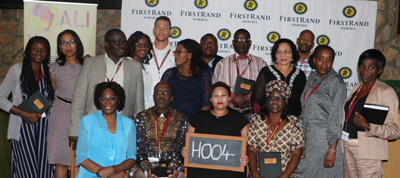
First seminar on ‘Social Policy, Social Protection, and Social Welfare in Africa’ held

The Ministry of Health and Social Services, in collaboration with the International Council on Social Welfare (ICSW) Africa, co-hosted a two-day seminar on “Social Policy, Social Protection, and Social Welfare in Africa” to address the role of social policy experts, social workers, and humanitarian aid professionals in various contexts across the African continent.
The seminar, hosted at the Hilton Hotel in Windhoek, will also address the following topics: the main challenges faced by social welfare and social protection policy in Africa; the socioeconomic impact and challenges of COVID-19 faced by African societies; remedial actions and present diagnosis, proposals, and good practice on social inclusion in various areas that can serve to redesign the policies of the 21st century; and efforts to accelerate the achievement of the SDGs by 2030 and the social dimensions of sustainable development beyond, with a focus on African Regional Priorities.
Taimi Amaambo, Acting Executive Director of the Ministry, said in her welcoming remarks at the event that “the most relevant issues and conclusions from this seminar” will be utilized to formulate a “Windhoek Declaration” that will be presented at the UN Summit on Social Development in 2025.
Amaambo continued: “Social protection systems have notably expanded in low and middle-income countries, including Namibia,” she said.
“However, it is estimated that more than half of the world’s population still lacks equitable access to social protection. Following the roughly 3-year trauma of COVID-19, the entire world is at a critical phase of transition. The global supply chain has been seriously hampered as a result of the disruption in global trade and exchanges caused by this dreadful pandemic. According to the World Bank, the depth of COVID-19 has surpassed that of the Great Depression, and the population that lives below the poverty line has grown by 100 million people,” she noted, adding that the current situation emphasizes the urgent need to address socioeconomic issues in communities to improve everyone’s long-term circumstances.
Meanwhile, Deputy Health Minister Dr. Esther Muinjangue stated at the ongoing seminar that societies that do not invest in social protection bear significant costs due to a lack of a healthy and productive workforce, economic insecurity, and social exclusion.
“According to the most recent International Labour Organisation estimates (ILO, WSPR 2020/22), the continent has the world’s lowest social protection coverage, at 17% of the total population, compared to the global average of 47% (ILO, WSPR 2020/22). That is largely due to the prevalence of the informal economy as the principal source of employment, as well as significant underinvestment in social protection, which is less than 5% of a country’s GDP on average, while the global average is 12.9% (ILO, WSPR 2020/22),” Muinjangue said on Thursday.
Muinjangue then stressed that this prevented the continent from reaping social protection benefits like poverty and vulnerability reduction, formalization of informal workers, and the abolition of forced and child labour.
“The COVID-19 pandemic has exacerbated this situation, exposing the gaps in social protection and underscoring the worrying consequences of insufficient coverage, particularly in the informal economy,” she added.
On the other hand, Dr. Sang-Mok Suh, ICSW President, stated that the United Nations estimates that there are 460 million impoverished people in Sub-Saharan Africa, with 46 million experiencing hunger. “There are many issues to be discussed in poverty reduction, some of which will be covered in this seminar. I like to point out my rule of thumb that poverty reduction can be tackled 70% by economic policies and 30% by social policies,” he added.
According to the United Nations Statistics Division (UNSD), most regions have not yet recovered to their 2019 levels. “The two regions with the highest working poverty rates—sub-Saharan Africa and Oceania (excluding Australia and New Zealand)—have also experienced the largest increases in the past two years. The pandemic has likely exacerbated existing disparities in working poverty rates for youth and women, who were already more likely than adults and men to be among the working poor,” said the UNSD recently.












































